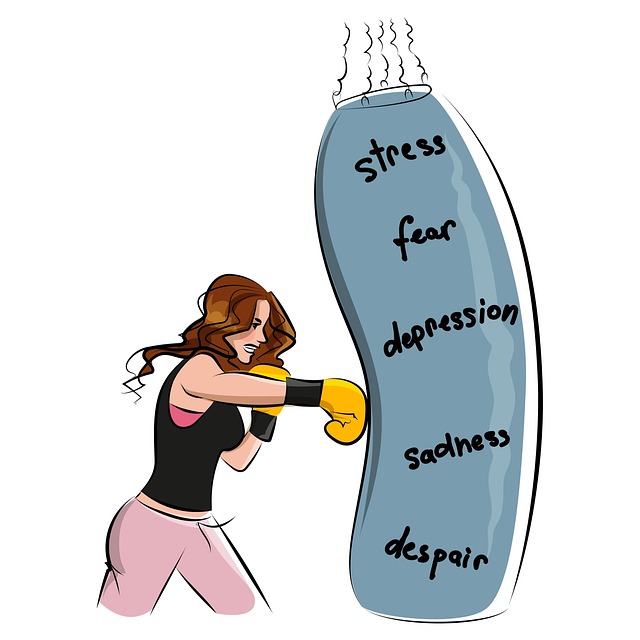Burnout is a significant issue among healthcare providers, particularly in high-stress fields like Littleton Family Counseling Therapy (LFCT), where long hours and heavy caseloads are common. LFCT recognizes burnout's stages: emotional exhaustion, depersonalization, and reduced personal accomplishment. They offer preventive strategies such as Social Skills Training, Stress Reduction Methods, and Conflict Resolution Techniques to mitigate these issues. Open communication, peer support, and professional development opportunities foster a supportive work environment. Self-care through relaxation, exercise, and hobbies, guided by Mind Over Matter principles, enhances resilience. Advocating for robust mental health policies ensures access to resources and support systems, preventing burnout and promoting career satisfaction. Family Counseling Therapy at LFCT provides professionals with a safe space to address personal conflicts, reducing the risk of emotional exhaustion and depersonalization.
Healthcare provider burnout is a growing concern, impacting not just individuals but the entire healthcare system. This comprehensive guide explores strategies to prevent burnout among medical professionals, focusing on understanding its root causes and implementing effective solutions. From identifying red flags early on to fostering supportive work environments and encouraging self-care, we delve into actionable steps. Furthermore, we highlight the valuable role of family counseling therapy in Littleton, providing a holistic approach to address the mental health needs of healthcare providers.
- Understanding Burnout Among Healthcare Providers
- Identifying Red Flags and Early Warning Signs
- Creating a Supportive Work Environment
- Implementing Self-Care Practices for Professionals
- The Role of Family Counseling Therapy in Burnout Prevention
Understanding Burnout Among Healthcare Providers

Burnout among healthcare providers is a growing concern that can significantly impact both individual well-being and patient care quality. It’s essential to recognize that the demands of the job, including long hours, high-stress situations, and emotional strain, contribute to this phenomenon. Healthcare professionals, especially those in demanding fields like Littleton Family Counseling Therapy, often juggle heavy caseloads, complex client needs, and the constant pressure to deliver exceptional care. This combination can lead to chronic stress, exhaustion, and a detachment from work, ultimately resulting in burnout.
Understanding burnout involves recognizing its stages: emotional exhaustion, depersonalization, and reduced personal accomplishment. Early signs, such as increased irritability, cynicism, and feelings of ineffectiveness, should be addressed promptly. Implementing effective prevention strategies is crucial to mitigate these issues. Social Skills Training, Stress Reduction Methods, and Conflict Resolution Techniques have proven beneficial in fostering a healthier work environment and enhancing coping mechanisms among healthcare providers.
Identifying Red Flags and Early Warning Signs

Burnout among healthcare providers is a growing concern, but recognizing red flags early can make all the difference. At Littleton Family Counseling Therapy, we understand the importance of identifying when a provider might be showing signs of exhaustion or disengagement. These could include decreased productivity, increased irritability or cynicism, and a general sense of detachment from work. It’s crucial to pay attention to changes in mood, energy levels, and the quality of patient care.
By fostering a culture that prioritizes open communication and encourages staff to seek support, organizations like Littleton Family Counseling Therapy can offer trauma support services tailored to individual needs. Additionally, incorporating practices such as mindfulness meditation—a strategy gaining recognition for its benefits in mental healthcare practice—can help providers maintain balance and cultural sensitivity.
Creating a Supportive Work Environment

At Littleton Family Counseling Therapy, we understand that creating a supportive work environment is a key component in preventing healthcare provider burnout. A positive and nurturing atmosphere can significantly impact a clinician’s well-being and resilience. This involves fostering open communication among colleagues, encouraging peer support, and providing opportunities for professional growth and development. By prioritizing a culture of respect, empathy, and collaboration, healthcare organizations can ensure that providers feel valued and empowered in their roles.
Incorporating practices such as Mindfulness Meditation and Trauma Support Services can further strengthen this environment. These strategies help clinicians manage stress, enhance emotional regulation, and cultivate a sense of inner peace. Additionally, training in Conflict Resolution Techniques is invaluable for addressing interpersonal challenges that may arise in the workplace. Through these comprehensive approaches, Littleton Family Counseling Therapy strives to create a sustainable and healthy work environment where providers can thrive and offer exceptional patient care.
Implementing Self-Care Practices for Professionals

In the high-pressure world of healthcare, professionals like those at Littleton Family Counseling Therapy understand the importance of self-care to combat burnout. Implementing practices that nurture mental and physical well-being is essential for maintaining a healthy work-life balance. This can include dedicated time for relaxation, regular exercise, and engaging in hobbies outside of work. By adopting Mind Over Matter Principles, healthcare providers can enhance their resilience and better manage stress.
Encouraging professionals to prioritize self-care goes hand in hand with advocating for a robust Mental Health Policy Analysis and Advocacy framework within healthcare institutions. This ensures that resources and support systems are in place to facilitate the well-being of mental health workers. When providers feel valued, supported, and empowered, they are more likely to engage in confidence-boosting activities that prevent burnout and promote long-term career satisfaction.
The Role of Family Counseling Therapy in Burnout Prevention

Burnout among healthcare providers is a growing concern, but implementing strategies to prevent and mitigate it can make a significant difference in their well-being and practice longevity. One effective approach that often goes overlooked is Family Counseling Therapy. This form of therapy can be a powerful tool for healthcare workers who may struggle with personal or professional conflicts that contribute to burnout.
Littleton Family Counseling Therapy, for instance, offers professionals a safe space to explore challenging dynamics within their families, including improving self-esteem and learning conflict resolution techniques. By addressing these internal issues, providers can reduce the risk of burnout associated with emotional exhaustion and depersonalization. Incorporating therapy sessions into wellness plans can help individuals develop resilience and better manage stress, ultimately enhancing their mental wellness and enabling them to provide quality care for years to come.
Burnout among healthcare providers is a growing concern, but by understanding and addressing its causes, we can foster a more supportive work environment. Identifying red flags early, encouraging self-care practices, and providing access to counseling services like Littleton Family Counseling Therapy can significantly prevent burnout. These strategies not only benefit individual professionals but also enhance the overall quality of healthcare services.














